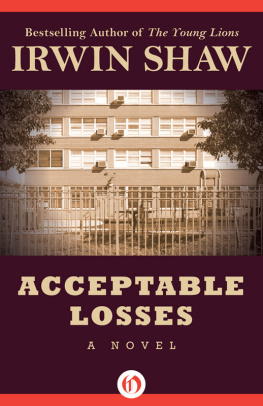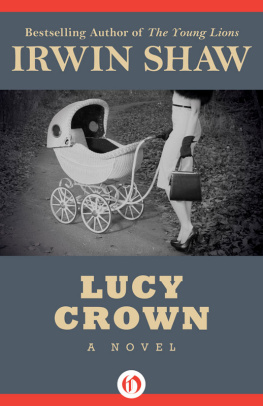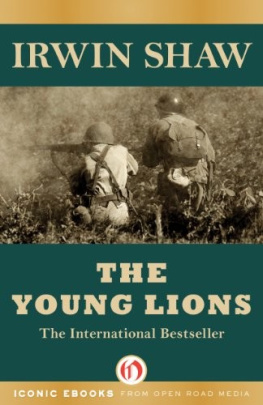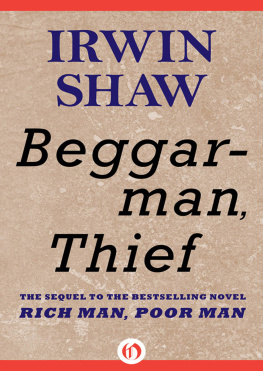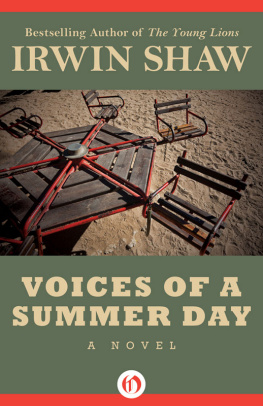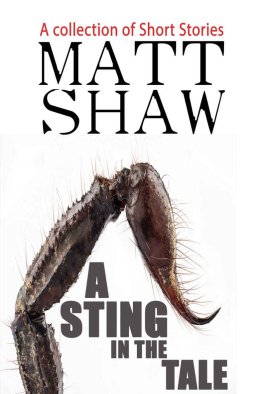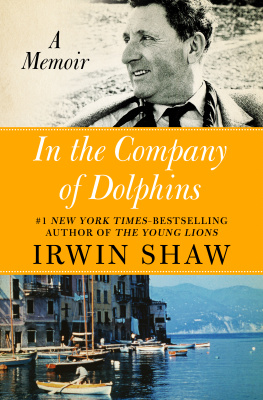Irwin Shaw - Short Stories: Five Decades
Here you can read online Irwin Shaw - Short Stories: Five Decades full text of the book (entire story) in english for free. Download pdf and epub, get meaning, cover and reviews about this ebook. year: 2013, publisher: Open Road Integrated Media, genre: Art. Description of the work, (preface) as well as reviews are available. Best literature library LitArk.com created for fans of good reading and offers a wide selection of genres:
Romance novel
Science fiction
Adventure
Detective
Science
History
Home and family
Prose
Art
Politics
Computer
Non-fiction
Religion
Business
Children
Humor
Choose a favorite category and find really read worthwhile books. Enjoy immersion in the world of imagination, feel the emotions of the characters or learn something new for yourself, make an fascinating discovery.

- Book:Short Stories: Five Decades
- Author:
- Publisher:Open Road Integrated Media
- Genre:
- Year:2013
- Rating:3 / 5
- Favourites:Add to favourites
- Your mark:
- 60
- 1
- 2
- 3
- 4
- 5
Short Stories: Five Decades: summary, description and annotation
We offer to read an annotation, description, summary or preface (depends on what the author of the book "Short Stories: Five Decades" wrote himself). If you haven't found the necessary information about the book — write in the comments, we will try to find it.
Short Stories: Five Decades — read online for free the complete book (whole text) full work
Below is the text of the book, divided by pages. System saving the place of the last page read, allows you to conveniently read the book "Short Stories: Five Decades" online for free, without having to search again every time where you left off. Put a bookmark, and you can go to the page where you finished reading at any time.
Font size:
Interval:
Bookmark:
Short Stories
Five Decades
Irwin Shaw

Many thanks to my editor, Kathy Anderson, for her invaluable assistance and advice
Bought by Maraya21
kickass.so / 1337x.to / h33t.to / thepiratebay.se
To Arthur Stanton

Contents

Introduction by Irwin Shaw
I am a product of my times. I remember the end of World War I, the bells and whistles and cheering, and as an adolescent I profited briefly from the boom years. I suffered the Depression; exulted at the election of Franklin D. Roosevelt; drank my first glass of legal 3.2 beer the day Prohibition ended; mourned over Spain; listened to the Communist sirens; sensed the coming of World War II; went to that war; was shamed by the McCarthy era; saw the rebirth of Europe; marveled at the new generations of students; admired Kennedy; mourned over Vietnam. I have been both praised and blamed, all the while living my private life the best way I could.
I have written stories in Brooklyn, Greenwich Village, on Fifth Avenue, in the New Yorker office on 43rd Street, in Connecticut, Cairo, Algiers, London, Paris, Rome, the Basque country, on ships, in the Alps, in the Mojave Desert, and bits and pieces on transcontinental trains.
All these things, in one way or another, are reflected in my stories, which I now see as a record of the events of almost sixty years, all coming together in the imagination of one American. Of course there are gaps. Other writers have filled many of these but some remain and will never be filled.
Why does a man spend fifty years of his life in an occupation that is often painful? I once told a class I was teaching that writing is an intellectual contact sport, similar in some respects to football. The effort required can be exhausting, the goal unreached, and you are hurt on almost every play; but that doesnt deprive a man or a boy from getting peculiar pleasures from the game.
In a preface to an earlier collection I described some of those pleasures. Among them, I wrote, there is the reward of the storyteller, sitting cross-legged in the bazaar, filling the need of humanity in the humdrum course of the ordinary day for magic and distant wonders, for disguised moralizing that will set everyday transactions into larger perspectives, for the compression of great matters into digestible portions, for the shaping of mysteries into sharply edged and comprehensible symbols.
Then there is the private and exquisite reward of escaping from the laws of consistency. Today you are sad and you tell a sad story. Tomorrow you are happy and your tale is a joyful one. You remember a woman whom you loved wholeheartedly and you celebrate her memory. You suffer from the wound of a woman who treated you badly and you denigrate womanhood. A saint has touched you and you are a priest. God has neglected you and you preach atheism.
In a novel or a play you must be a whole man. In a collection of stories you can be all the men or fragments of men, worthy and unworthy, who in different seasons abound in you. It is a luxury not to be scorned.
Originally this book was intended to contain all of my stories, but when the count was made the total came to eighty-four, and to include them all would have meant a formidably bulky and outrageously expensive book. Since my publishers and I agreed that we did not wish to produce a volume that the reader could neither carry nor afford, we fixed on sixty-three stories as a reasonable number and began the sad process of winnowing out the ones we would leave behind. It was a little like being the commander of a besieged town who knows he cannot evacuate all his troops and is forced to decide who shall go and who shall stay to be overrun by the enemy. And the enemy in this case might be oblivion.
The experience of going through the stories was also something like what is supposed to happen when a man is drowning, as scene after scene of his life passes before his eyes. If the drowning man is devout, it can be imagined that in those final moments he examines the scenes to determine the balance between his sins and his virtues with a view toward eventual salvation. Since I am not particularly devout, my chances for salvation lie in a place sometime in the future on a library shelf. These stories were selected, often with doubts and misgivings, with the hope that a spot on that distant shelf is waiting for them.
Irwin Shaw
1978

The Eighty-Yard Run
T he pass was high and wide and he jumped for it, feeling it slap flatly against his hands, as he shook his hips to throw off the halfback who was diving at him. The center floated by, his hands desperately brushing Darlings knee as Darling picked his feet up high and delicately ran over a blocker and an opposing linesman in a jumble on the ground near the scrimmage line. He had ten yards in the clear and picked up speed, breathing easily, feeling his thigh pads rising and falling against his legs, listening to the sound of cleats behind him, pulling away from them, watching the other backs heading him off toward the sideline, the whole picture, the men closing in on him, the blockers fighting for position, the ground he had to cross, all suddenly clear in his head, for the first time in his life not a meaningless confusion of men, sounds, speed. He smiled a little to himself as he ran, holding the ball lightly in front of him with his two hands, his knees pumping high, his hips twisting in the almost girlish run of a back in a broken field. The first halfback came at him and he fed him his leg, then swung at the last moment, took the shock of the mans shoulder without breaking stride, ran right through him, his cleats biting securely into the turf. There was only the safety man now, coming warily at him, his arms crooked, hands spread. Darling tucked the ball in, spurted at him, driving hard, hurling himself along, his legs pounding, knees high, all two hundred pounds bunched into controlled attack. He was sure he was going to get past the safety man. Without thought, his arms and legs working beautifully together, he headed right for the safety man, stiff-armed him, feeling blood spurt instantaneously from the mans nose onto his hand, seeing his face go awry, head turned, mouth pulled to one side. He pivoted away, keeping the arm locked, dropping the safety man as he ran easily toward the goal line, with the drumming of cleats diminishing behind him.
How long ago? It was autumn then, and the ground was getting hard because the nights were cold and leaves from the maples around the stadium blew across the practice fields in gusts of wind, and the girls were beginning to put polo coats over their sweaters when they came to watch practice in the afternoons. Fifteen years. Darling walked slowly over the same ground in the spring twilight, in his neat shoes, a man of thirty-five dressed in a double-breasted suit, ten pounds heavier in the fifteen years, but not fat, with the years between 1925 and 1940 showing in his face.
The coach was smiling quietly to himself and the assistant coaches were looking at each other with pleasure the way they always did when one of the second stringers suddenly did something fine, bringing credit to them, making their $2,000 a year a tiny bit more secure.
Next pageFont size:
Interval:
Bookmark:
Similar books «Short Stories: Five Decades»
Look at similar books to Short Stories: Five Decades. We have selected literature similar in name and meaning in the hope of providing readers with more options to find new, interesting, not yet read works.
Discussion, reviews of the book Short Stories: Five Decades and just readers' own opinions. Leave your comments, write what you think about the work, its meaning or the main characters. Specify what exactly you liked and what you didn't like, and why you think so.

